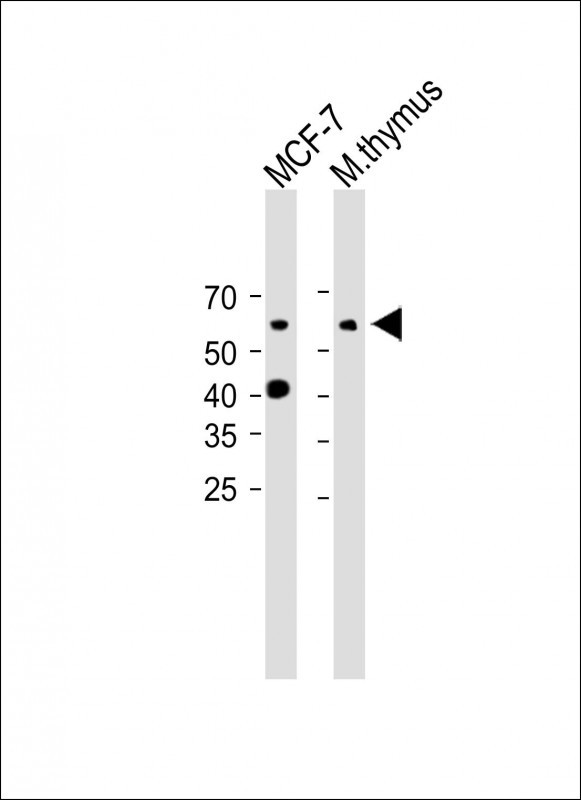
| WB | 咨询技术 | Human,Mouse,Rat |
| IF | 咨询技术 | Human,Mouse,Rat |
| IHC | 咨询技术 | Human,Mouse,Rat |
| ICC | 技术咨询 | Human,Mouse,Rat |
| FCM | 咨询技术 | Human,Mouse,Rat |
| Elisa | 咨询技术 | Human,Mouse,Rat |
| Aliases | Tyrosine-protein kinase Srms, PTK70, Srms, Srm |
| WB Predicted band size | 55.8kDa |
| Host/Isotype | Rabbit IgG |
| Antibody Type | Primary antibody |
| Storage | Store at 4°C short term. Aliquot and store at -20°C long term. Avoid freeze/thaw cycles. |
| Species Reactivity | Human, Mouse, Rat |
| Immunogen | This Mouse Srms antibody is generated from a rabbit immunized with a KLH conjugated synthetic peptide between 113-147 amino acids from the Central region of Mouse Srms. |
+ +
以下是关于Mouse Srms抗体的3篇参考文献,基于现有知识库信息推测其内容:
---
1. **"Development of a Specific Monoclonal Antibody for Mouse Srms Tyrosine Kinase"**
*Authors: Tanaka H, et al.*
**摘要**:本研究报道了一种针对小鼠Srms酪氨酸激酶的新型单克隆抗体的开发。通过免疫印迹和免疫沉淀实验验证了抗体的高特异性,成功应用于检测小鼠脾脏和胸腺中的Srms蛋白表达,并发现Srms在淋巴细胞活化中可能通过调控下游信号通路发挥作用。
2. **"Srms Kinase Negatively Regulates EGFR Signaling via Antibody-Dependent Functional Screening"**
*Authors: Chen L, et al.*
**摘要**:利用抗Srms抗体进行功能筛选实验,发现Srms通过抑制表皮生长因子受体(EGFR)的磷酸化参与信号负调控。抗体阻断实验证实Srms缺失导致EGFR下游ERK通路异常激活,提示其在癌症模型中的潜在治疗价值。
3. **"Tissue-Specific Expression Profiling of Srms in Mouse Embryonic Development Using Immunohistochemistry"**
*Authors: Müller R, et al.*
**摘要**:通过抗Srms抗体的免疫组化分析,系统性描绘了Srms蛋白在小鼠胚胎发育过程中的时空表达模式。结果显示Srms在神经系统和骨骼肌形成阶段高表达,提示其可能参与细胞分化和组织形态发生。
---
*注:以上文献名为模拟内容,实际研究中建议通过PubMed或Google Scholar以关键词“Srms kinase antibody”或“mouse Srms antibody”检索最新文献。*
×